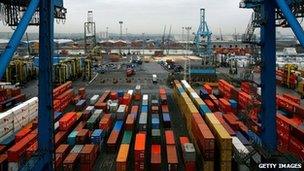IMF raises UK economic growth forecast
- Published

The IMF upgrade for the UK economy comes after other surveys have shown increasing optimism
The International Monetary Fund (IMF) has lifted its economic growth forecast for the UK this year from 0.7% to 0.9%.
Not since April 2012 has the IMF raised its UK forecast. A Treasury spokesman said it showed that the economy was moving from "rescue to recovery".
In April this year, the Fund cut its forecast to 0.7% from 1%, sparking wide debate about whether Chancellor George Osborne should alter his policies.
Also on Tuesday, the IMF cut its forecast for global economic growth.
The Fund's World Economic Outlook trimmed overall global growth this year by 0.2% to 3.1% because of weakness in emerging market economies. In 2014, growth is forecast to be 3.8%, also down 0.2%.
Rising confidence
Although the upward revision of UK growth is modest, it is likely to be cited as evidence that the economy is moving in the right direction.
It comes after surveys in recent days reported a rise in business optimism, growth in the service sector, and confidence in the housing market.
A survey from research firm Markit indicated that the UK service sector grew at its fastest pace for two years in June, and a British Chambers of Commerce survey found UK business confidence at a six-year high.
However, this was tempered on Tuesday with latest Office for National Statistics data showing that UK manufacturing output unexpectedly fell in May.
A Treasury spokesman welcomed the Fund's report: "The IMF has confirmed that the UK economy is moving from rescue to recovery, revising up its growth forecast for this year.
"But the IMF again warns of the continued risks to the global economy, showing that the recovery cannot be taken for granted."
However, Ed Balls, Labour's shadow chancellor, said the Fund had simply confirmed that the UK economy was "flatlining".
He said: "The IMF believes Britain's economic recovery will remain weak. While this year's figure has been revised up, it is disappointing that this is still a lower forecast than the IMF was making at the start of this year."
Eurozone recession
The IMF's lowering of global growth "was due to appreciably weaker domestic demand and slower growth in several key emerging market economies, as well as by a more protracted recession in the euro area".
Growth in China, Russia, Brazil, India and South Africa will be slower.
The IMF also warned that growth in some economies in the Middle East and North Africa would slow "because of difficult political and economic transitions".
In the US, growth is projected to rise from 1.7% in 2013 to 2.7% in 2014 on the back of rising domestic demand and confidence in the housing market.
The IMF said: "Downside risks to global growth prospects still dominate: while old risks remain, new risks have emerged, including the possibility of a longer growth slowdown in emerging market economies, especially given risks of lower potential growth, slowing credit, and possibly tighter financial conditions if the anticipated unwinding of monetary policy stimulus in the US leads to sustained capital flow reversals."
- Published9 July 2013
- Published3 July 2013
- Published6 June 2013
- Published3 June 2013